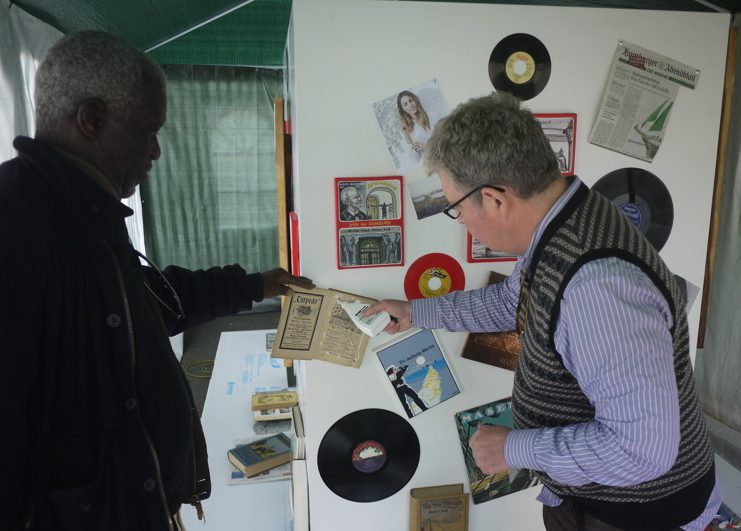„Altonaer Balkon“, Hamburg, Germany
30 May 2015 - 30 Aug 2015

work in progress - 'Georges Adéagbo: Inverted space', courtesy of the artist
Adéagbo’s previous interventions in public space, for example his installation on the Campo Arsenale at the Venice Biennial 1999, and in Hamburg in mid September 2014, lasted only one day. Now he shows for the first time an installation in open space for several months.
“Inverted space” is the short term for Adéagbos act of reversing the conventional visitor – space relationship. Normally visitors see his installation by entering a room in a museum, a protected environment with restricted access. This time, Adéagbo turns the room inside out, installs on its walls that form a white block and puts the installation under a glass cover, accessible to anyone anytime in public space. This is both a spatial and art-political reversal.
Half of the elements that Adéagbo shows are objects found in the streets of the city where he is invited to do a project. Usually, his rhizomatic networks of objects and hand-written texts end up in Museums or private collections. This time in Hamburg, he returns some of the objects to their origin: the public zone, yet musealizes them through a glass cover which makes them untouchable.
The location on the “Altona Balcony” allows a view on the harbor of Hamburg and the River Elbe, the link to the North Sea and Oceans of the earth. There is no place more fitting than this, because Adéagbos collections of elements from West – Africa and images of Hamburg, reproduced by sign-painters in Benin, are as much a field of cultural transfer and mobilization of things 1, as is the harbor of Hamburg where goods come and go, and different cultures meet.
The visitor of “Inverted Space” will see things, that seem familiar, yet are foreign at the same time, a result of Adéagbo reversing the hierarchical roles of the discoverer and the discovered.
Adéagbos exploration and interpretation of Western, in this case Hamburg culture and history will trigger the viewers reflection on how they deal themselves with cultural difference and the so- called “others”. The installation will be a mirror in two senses: one can see ones own attitudes yet also see ones own face, reflected by the glass that protects Adéagbos installation, at the same time.
The project was curated by Sophie Goltz, Stadtkuratorin Hamburg (curating public art of the city of Hamburg) and Stephan Köhler, independent curator and founder of Kulturforum Sud-Nord. Adéagbo born 1942 in Cotonou spends since 2000 invited by Kulturforum Sud-Nord every year several months in Hamburg, and got to know the city well. His work is known internationally since his participation at the Documenta 11, 2002, and the 1999 and 2009 Venice Biennials.
The project is organized jointly by the non-profit organization Kulturforum Sud-Nord and Stadtkuratorin Hamburg (curating public art of the city of Hamburg)